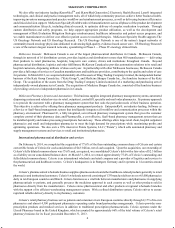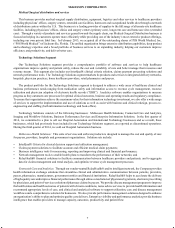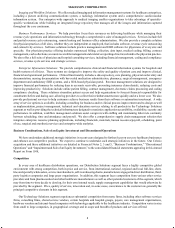McKesson 2014 Annual Report Download - page 19
Download and view the complete annual report
Please find page 19 of the 2014 McKesson annual report below. You can navigate through the pages in the report by either clicking on the pages listed below, or by using the keyword search tool below to find specific information within the annual report.
McKESSON CORPORATION
16
We also may experience difficulties and delays inherent in sourcing products and contract manufacturing from foreign countries,
including but not limited to: (1) difficulties in complying with the requirements of applicable federal, state and local governmental
authorities in the United States and of foreign regulatory authorities; (2) inability to increase production capacity commensurate
with demand or the failure to predict market demand; (3) other manufacturing or distribution problems including changes in types
of products produced, limits to manufacturing capacity due to regulatory requirements, physical limitations, or scarce or inadequate
resources that could impact continuous supply; and (4) damage to our reputation due to real or perceived quality issues. For
example, the FDA has conducted investigations and banned certain generics manufacturers from selling certain raw materials and
drug ingredients in the U.S. from overseas plants due to quality issues. Difficulties in manufacturing or access to raw materials
could result in production shutdowns, product shortages and other similar delays in product manufacturing that could have a
material adverse impact on our financial condition and results of operations.
Our business could be hindered if we are unable to complete and integrate acquisitions successfully.
An element of our strategy is to identify, pursue and consummate acquisitions that either expand or complement our business.
Integration of acquisitions involves a number of significant risks, including the diversion of management’s attention to the
assimilation of the operations of businesses we have acquired; difficulties in the integration of operations and systems; the realization
of potential operating synergies; the assimilation and retention of the personnel of the acquired companies; accounting, regulatory
or compliance issues that could arise, including internal control over financial reporting; challenges in retaining the customers of
the combined businesses. Further, acquisitions may have a material adverse impact on our operating results if unanticipated
expenses or charges to earnings were to occur, including unanticipated depreciation and amortization expenses over the useful
lives of certain assets acquired, as well as costs related to potential impairment charges, assumed litigation and unknown liabilities.
In addition, we may potentially require additional financing in order to fund future acquisitions, which may or may not be attainable
and is subject to potential volatility in the credit markets. If we are unable to successfully complete and integrate strategic
acquisitions in a timely manner, our business and our growth strategies could be negatively affected.
On February 6, 2014, we completed the acquisition of 77.6% of the then outstanding common shares of Celesio and certain
convertible bonds of Celesio. Upon the acquisition, our ownership of Celesio’s fully diluted shares was 75.6%. At March 31,
2014, we owned approximately 75.4% of Celesio’s outstanding and fully diluted common shares. Celesio is an international
wholesale and retail company and provider of logistics and services to the pharmaceutical and healthcare sectors. Celesio’s
headquarters is in Stuttgart, Germany and it operates in 14 countries around the world. The acquisition of Celesio expands our
global geographic area; the combined company will be one of the largest pharmaceutical wholesalers and providers of logistics
and services in the healthcare sector worldwide.
Achieving the anticipated benefits of our acquisition of Celesio is subject to a number of risks and uncertainties, including
foreign exchange fluctuations, challenges of managing new international operations, and whether we can ensure continued
performance or market growth of Celesio’s product and services. The integration process is subject to a number of uncertainties
and no assurance can be given that the anticipated benefits of the transaction will be realized or, if realized, the timing of their
realization. It is possible that the integration process could take longer than anticipated, and could result in the loss of employees,
the disruption of each company’s ongoing businesses, processes and systems, or inconsistencies in standards, controls, procedures,
practices, policies and compensation arrangements, any of which could adversely affect our ability to achieve the anticipated
benefits of the Celesio acquisition and which could have a material adverse impact on our revenues, expenses, operating results
and financial condition.
Any significant diversion of management’s attention away from the ongoing businesses, and any difficulties encountered in
the acquisition, transition and integration process, could adversely affect our financial results, both prior to and after the acquisition
of Celesio. Moreover, the failure to achieve the anticipated benefits of the Celesio acquisition could result in increased costs or
decreases in the amount of expected revenues, and could adversely affect our future business, financial condition, operating results
and prospects. Events outside of our control, including the market price of Celesio shares that we did not acquire in the acquisition,
changes in regulations and laws, as well as economic trends, could also adversely affect our ability to realize the expected benefits
from our acquisition of Celesio.
























